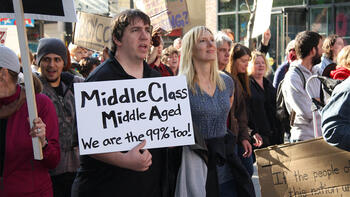
“Politics is really downstream from culture.” Andrew Breitbart’s assertion, echoing the ideas of the Marxist philosopher Antonio Gramsci, has become a watchword both for the Right and Left. This culture-first approach has fostered a politics built around cultural issues like abortion, gender, and race, guaranteeing ceaseless social unrest, and in some minds, the prelude to a breakup of the union.
While important, cultural issues are not the main concerns of most Americans. Instead, as Gallup surveys reveal, the more critical issues for most remain jobs, housing, and the economy. Roughly 30 percent of voters ranked economic issues as their key concern—incompetent government was the other big winner—six to ten times the number who cited climate, abortion, or race.
As our politics focus obsessively on cultural conflict, there is little discussion of how to make life better for most people. Europe has endured a decade of stagnation, while Americans’ life expectancy has recently fallen for the first time in peacetime. Data from AEI’s American National Family Life Survey, which sampled over 5,000 Americans and was fielded in November and December of 2021, found 74 percent of Americans believe that things are getting worse and barely a quarter (26 percent) see things improving.
Rediscover Pluralism and Federalism
To restore our focus, we need to de-nationalize the cultural debate. This means allowing various parts of the country to, within limits, express their own preferences. The Constitution wisely assigned most issues of culture—abortion, marriage rights, education, law enforcement—to the proper domain of states and localities.
This is a vast and diverse country with no singular voice on cultural issues. The focus on culture has helped engender the increasingly dogmatic parties with radically different bases who go to different movies, eat different food, and consume different media.
The Right dominates the culturally conservative South and parts of the West while the Left inhabits the narrow band of progressive-dominated dense communities on the ocean coasts, and college towns everywhere. On some issues—defunding the police, affirmative action, exposing children to transgender literature or not informing parents about their children’s gender change—progressive dogma is unpopular with the vast majority of voters, even in California. After decades of an inexorable shift to progressive views on cultural issues, the country, perhaps reacting to the antics of gender activists, is becoming not more liberal, but more culturally conservative.
The culturally conservative face similar problems with their unpopular stance against legalized abortion—some of their own fringe even oppose birth control. They have already lost decisively on the issue in red states like Ohio and Kansas, as well as Michigan. Gallup polls indicate that 46 percent of Americans think the country’s laws toward abortion should be less strict, which marks a 16 percentage point jump from January 2022, when only 30 percent said the same. Only 15 percent of Americans now think the laws should be stricter, and 26 percent are satisfied with how the laws are now.
Read the rest of this piece at American Mind.
Joel Kotkin is the author of The Coming of Neo-Feudalism: A Warning to the Global Middle Class. He is the Roger Hobbs Presidential Fellow in Urban Futures at Chapman University and Executive Director for Urban Reform Institute. Learn more at joelkotkin.com and follow him on Twitter @joelkotkin.
Homepage photo credit: Hollywata via Flickr under CC 2.0 License












